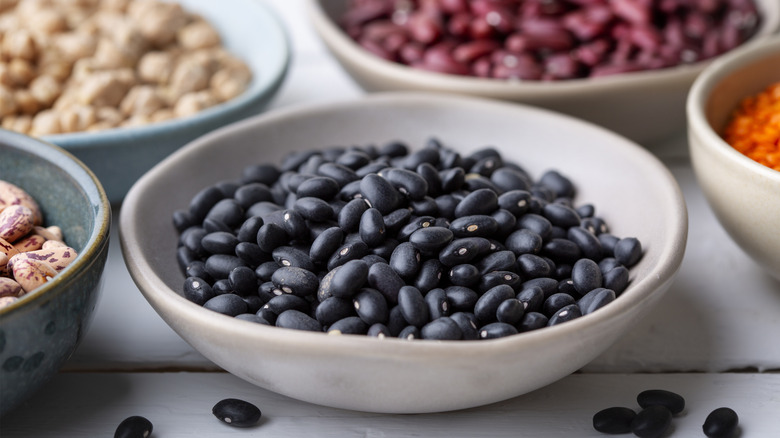
BearFotos/Shutterstock
As a kid, you probably couldn’t help but giggle when someone served beans at dinner. After all, who could resist the classic rhyme, “Beans, beans, the magical fruit, the more you eat…” — well, you know the rest. Even so, you still loaded up your plate with those sweet, saucy pork and beans next to a grilled hot dog, because even if beans made some noise later, they were worth it. And, as you got older, you perhaps relied on that “magical fruit” to sweep your digestive system clean, keeping things moving and your gut happy.
You can thank the fiber in beans. A cup of black beans will give you 15 grams of fiber, which is more than half of your fiber needs for the day. But the magic of black beans doesn’t stop at digestion. Remember another part of the rhyme, “Beans, beans, good for your heart.” The soluble fiber in black beans can prevent heart disease by lowering your “bad” LDL cholesterol. And because fiber slows digestion, it also keeps your blood sugar from spiking after meals, reducing your risk of type 2 diabetes.
But you’ll want to choose black beans for more than just fiber. According to a 2021 article in Nutrients, black beans are rich in anthocyanins, an antioxidant that gives them their dark color. Compared to lighter-colored beans, black beans have more of these phytochemicals to help manage your blood sugar and heart health.
How black beans fight heart disease

Ollo/Getty Images
You may already know how soluble fiber works to lower your cholesterol. Soluble fiber binds to the cholesterol in your intestine and shuttles it out of your body. That means less cholesterol is circulating through your blood. Black beans also help fight heart disease in other ways, according to a 2022 review in Plants. The phytochemicals in black beans prevent platelets in your blood from clumping together, which can sometimes lead to blood clots. Anthocyanins help to relax your blood vessels and improve circulation by boosting nitric oxide. Beans also control inflammation in your body, which can often lead to heart disease.
Replacing your favorite rice with some black beans can work to improve your cardiovascular system in the short term. In a 2021 study in Nutrition, Metabolism and Cardiovascular Diseases, people ate either beans or rice and then had their blood pressure, blood flow, and cholesterol checked a few hours later. Eating beans reduced blood pressure and artery stiffness compared to rice. Black beans had the strongest effect on cardiovascular health, improving blood flow and lowering cholesterol within six hours.
How black beans lower your diabetes risk

Jlco – Julia Amaral/Getty Images
Eating more beans can lower your risk of type 2 diabetes. Although a 2018 study in Clinical Nutrition didn’t focus exclusively on black beans, it found that people who ate the most beans had a 35% lower risk of developing type 2 diabetes. Much of the anti-diabetic power of black beans lies in their outer skin, according to a 2023 article in the Journal of Functional Foods. Researchers extracted the phytochemicals from the skin of black beans and gave the extract to diabetic rats. The extract lowered blood sugar, reduced inflammation and oxidative stress, and improved cholesterol and fat metabolism. The peel of the black bean also supported the gut microbiome, which plays a role in metabolic health.
If you really love rice but want to avoid the blood sugar spike, try adding black beans. A 2012 study in the Nutrition Journal had people with type 2 diabetes eat either rice or rice mixed with three types of beans. Researchers tracked their blood sugar levels for three hours after the meals. Compared to rice alone, the beans and rice mix caused smaller increases in blood sugar. Among the beans, black beans and pinto beans were more effective at reducing blood sugar than red kidney beans.
While traditionally cooked black beans can help reduce your risk of type 2 diabetes, fermented black beans may offer even more benefits. A 2020 study in Legume Science found that fermenting black beans boosts their protein and phytochemical content. These nutrients can block enzymes that contribute to blood sugar spikes and fat accumulation.
Credit: healthdigest.com









